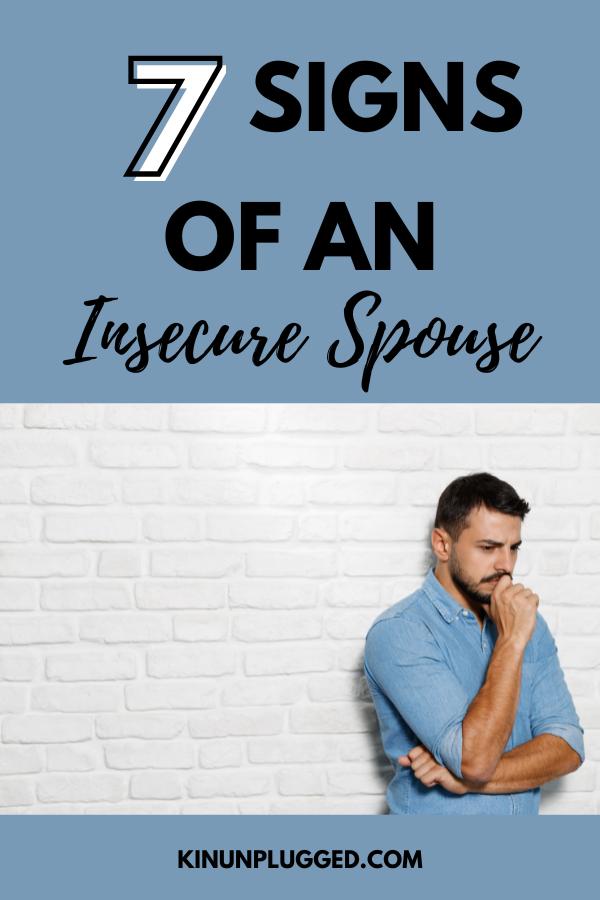When you’re dealing with an insecure husband, it can affect your marriage on a daily basis. You can start to tiptoe around your partner when you don’t know how you might trigger his insecurities.
An insecure husband is a sensitive issue and always has deep roots. Being insecure in a relationship doesn’t happen out of the blue but always stems from something. It could be a childhood trauma or a past event within your marriage, for example.
READ: 9 Clear Childhood trauma symptoms in adults
In this article, we’ll talk about some strategies you can apply in your marriage when dealing with your insecure husband. We’ll also touch on the ways that an insecure spouse can affect your marriage.
To start with though, what are some of the most glaring signs on insecurity in a husband?
How does an insecure man treat his wife?
An insecure man may treat his wife in ways that stem from his own fears and lack of self-confidence. It can manifest in behaviors from being controlling to overly needy, making the relationship difficult to handle. If you’re dealing with an insecure husband, you might notice some of the following patterns:

1. Controlling behavior
Insecurity can make a man feel like he’s losing control. As a result, he may try to dominate or micromanage aspects of his wife’s life, from her social interactions to how she spends her time. This control is an attempt to minimize his own anxiety by maintaining a tight grip on his environment.
2. Constant need for reassurance
An insecure husband often craves validation and will repeatedly ask if you love him, find him attractive or are happy in the marriage. While occasional reassurance is normal, constant questioning can become emotionally draining.
3. Jealousy and mistrust
Insecure men are more likely to become jealous, even when there’s no reason. They may overreact to their wife’s interactions with other men or accuse her of infidelity, reflecting their own internal fears rather than her actual behavior.
4. Overly dependent
Insecure men may be emotionally clingy and overly dependent on their wife for support. They may rely heavily on her to boost their self-esteem, making her responsible for their emotional well-being.
5. Criticism and put-downs
Some insecure husbands express their self-doubt by putting down their wives, criticizing their decisions, or belittling their achievements. This negative behavior is often a defense mechanism to make themselves feel superior when they’re actually struggling with their own inadequacies.
6. Attempts to isolate
An insecure husband may try to isolate his wife from friends and family to gain more control. This behavior stems from a fear of losing her or feeling unimportant compared to others in her life.
7. Mood swings and anger
Insecure men may experience unpredictable mood swings and display sudden bursts of anger. These outbursts are often triggered by minor incidents but are rooted in deeper feelings of inadequacy.
Can insecurities ruin a marriage?

Yes, insecurities can significantly harm and potentially ruin a marriage if they’re not addressed. When one or both partners are insecure, it can lead to behaviors that undermine trust, intimacy and connection.
Some common ways insecurities can negatively impact a marriage include:
- Jealousy and possessiveness
Insecure partners may become overly jealous, leading to constant accusations or monitoring, which creates an atmosphere of distrust.
- Neediness and clinginess
An insecure partner may demand constant reassurance, which can exhaust the other person and lead to emotional burnout.
- Control issues
Insecurity can manifest as a need to control the other partner’s actions, decisions or social interactions, limiting freedom and encouraging resentment.
- Emotional withdrawal
Feeling unworthy or anxious can cause insecure partners to pull back emotionally, creating distance and a lack of intimacy.
- Communication breakdown
Insecurities often lead to misunderstandings and defensive behavior, making it difficult for couples to communicate openly and resolve conflicts.
- Trust issues
Insecurities can make it hard to trust a partner’s love and commitment, leading to constant suspicion, second-guessing and a lack of emotional safety.
- Erosion of self-esteem in both partners
The insecure partner’s low self-esteem can rub off on the other partner, making them feel inadequate or like they’re never enough to “fix” the insecurity.
Addressing insecurities through open communication, therapy and self-work is essential to maintain a healthy, thriving marriage. If left unchecked, insecurities can create a toxic environment that pushes partners apart.
How to deal with an insecure partner
Dealing with an insecure husband can be difficult because insecurity often manifests in behaviors that create tension and disrupt the harmony of a relationship. Addressing these issues effectively requires understanding the roots of insecurity and taking steps to manage it in a way that encourages trust, communication and mutual respect. According to research, insecurity is often rooted in past trauma, low self-confidence, fear of rejection or previous relationship experiences that were negative or abusive.

These underlying causes can lead to behaviors such as jealousy, possessiveness, and constant need for reassurance, which, if left unchecked, can strain the relationship and even lead to abusive patterns.
How to manage insecurity in a relationship
- Open communication
Create an environment where your partner feels safe to express their insecurities without judgment. Address concerns as they arise and discuss boundaries and expectations openly. It’s essential to let them know that their feelings are valid but also reinforce the need for mutual trust.
- Set boundaries and stick to them
Establish clear and healthy boundaries around controlling behaviors, like incessant questioning, tracking whereabouts, or possessiveness. Make it clear that while you want to support them, these actions are harmful to the relationship and must change.
- Encourage Professional help
In severe cases, insecurity may be rooted in deep-seated issues that are beyond what a partner can resolve alone. Suggest individual or couples therapy as a safe space to explore these emotions and develop healthier coping mechanisms.
- Reinforce positive self-talk and build confidence
Help your partner identify and challenge negative self-beliefs. Encourage them to replace self-criticism with affirmations that build self-esteem and confidence. Sometimes insecurity is a reflection of how a person views themselves, rather than how they perceive the relationship
- Address jealousy constructively
If jealousy is a recurring theme, distinguish between “normal” jealousy and unhealthy, controlling jealousy. Occasional, mild jealousy can motivate couples to appreciate one another more, but irrational jealousy – marked by excessive questioning or accusations – can damage trust and intimacy - Focus on rebuilding trust together
A lack of trust is often at the core of insecurity. Work on building trust by being consistent, reliable, and transparent in your actions. Small gestures like sticking to commitments, being open about your feelings, and avoiding secrecy can go a long way in reinforcing a sense of security in the relationship.
RELATED: Rebuilding Marriage after Infidelity
- Support independence and personal growth
Encourage your partner to pursue hobbies, friendships and interests outside of the relationship. A well-rounded sense of identity that extends beyond the marriage can help reduce clinginess and neediness, leading to a healthier dynamic.
- Avoid reassurance traps
While reassurance can help soothe your partner temporarily, excessive reassurance-seeking can become a cycle that reinforces their insecurity. Instead of always responding to “Do you really love me?” type questions, focus on actions that demonstrate your commitment and build trust gradually.
- Validate without enabling
When your partner expresses insecurity, validate their emotions but avoid enabling behaviors like constant checking-in or changing your actions to accommodate irrational fears. Make it clear that the relationship needs to be built on trust, not control or endless reassurance.
- Build a partnership of equals
Ultimately, dealing with an insecure husband requires a balance of empathy and firmness. Communicate that you are committed to the relationship but both partners need to work towards creating a dynamic where both feel secure, respected and valued.
By addressing the root causes of insecurity, practicing patience and setting boundaries, you can help create a more secure and trusting relationship. However, professional help is often necessary when insecurity leads to controlling or harmful behaviors that impact both partners’ mental health and wellbeing.
I hope these tips are a helpful starting point for you in dealing with the insecurity in your marriage.
What are some strategies that you have already tried?






1 Comment
A friend of mine went through something very similar, and this article would be so helpful for her. It’s tough handling an insecure husband because it impacts every part of your relationship. Understanding that it comes from a deeper place, like past experiences or trauma, really changes how you approach it.